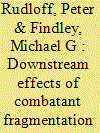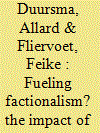| Srl | Item |
| 1 |
ID:
143321


|
|
|
|
|
| Summary/Abstract |
We consider whether the fragmentation of combatants during civil war has downstream effects on the durability of peace following civil wars. We contend that the splintering of combatant groups, a primary manifestation of rebel group fragmentation, produces potential spoiler groups that are neither incidental nor unimportant in the process of civil war resolution. Making connections to the spoiling and credible commitment literatures, we hypothesize that rebel splintering hastens the recurrence of civil wars. Using event history modeling and propensity score matching to analyze two different civil war datasets, we examine whether the occurrence of fragmentation during a civil war influences the length of peace after the civil war. The empirical analysis of fragmentation events during civil wars since World War II offers support for the hypothesis that splintering decreases the duration of post-civil war peace. The results suggest the need to pay closer attention to the dynamics of fragmentation, and particularly how these dynamics lead to future consequences – even when those consequences take place after the war has concluded. For example, governments that attempt to splinter groups or to use existing fragmentations within rebel groups to end a civil war may encourage the unintended consequence of shorter peace duration.
|
|
|
|
|
|
|
|
|
|
|
|
|
|
|
|
| 2 |
ID:
178210


|
|
|
|
|
| Summary/Abstract |
While peace processes increase the likelihood that a civil war is resolved, they can also complicate peace by increasing the risk of rebel fragmentation. In this article, we argue that negotiations exacerbate pre-existing structural and substantial divisions within rebel organizations, therefore increasing the likelihood of a rebel split. More specifically, we put forward a theoretical framework that specifies why factions within a rebel group may disagree with the onset of negotiations, the conclusion of a peace agreement, or the implementation of an agreement—and thus break away during the peace process. We empirically assess the merit of this framework by systematically comparing the impact of these phases in a peace process on the fragmentation of rebel organizations. Using data that more accurately reflect the moment a rebel split takes place than earlier studies, we find that peace processes have a greater substantial impact on rebel fragmentation than previously assumed.
|
|
|
|
|
|
|
|
|
|
|
|
|
|
|
|